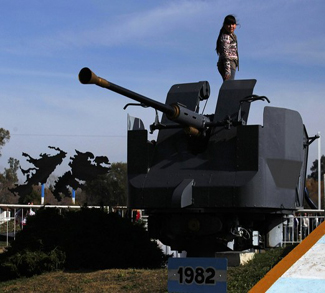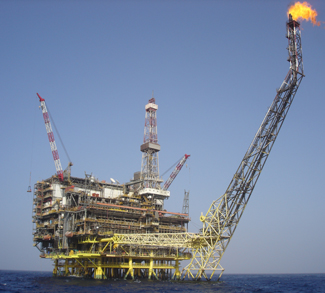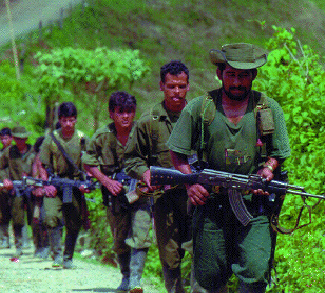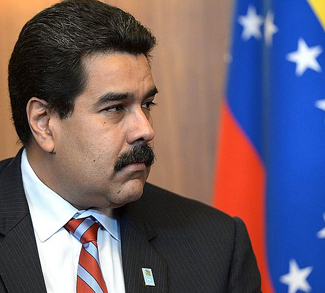As this year marks the 30th anniversary of the Falklands War, Argentina and the United Kingdom are locked in an intense war of words, looming legal disputes, potential economic hostilities, and a bitter public relations fight—all this over the unsettled sovereignty of the Falkland Islands, a tiny archipelago in the South Atlantic inhabited by 3,000 people.
On 14 June 2012, Argentinian President Cristina Fernandez de Kirchner chided the UK before the UN Decolonization Committee, calling the British to “negotiations” over the sovereignty of the disputed territory, accusing them of harboring imperialist pretensions, and warning that the world has “new protagonists.” Some days later at the G-20 summit in Mexico, in a move reminiscent of President Obama’s seeking out of Hugo Chavez at a previous summit, Prime Minister David Cameron, incensed at the escalation of rhetoric, confronted the Argentinian President and asked her to respect the referendum that has been scheduled by islanders for early 2013. She then attempted to give him an envelope allegedly detailing 40 UN resolutions pertaining to the Falklands, but he refused to accept it and walked away.
What the world is seeing in the South Atlantic is a war of legitimacies amongst three actors- an apparently zero-sum contention that will pit two sacrosanct principles of international law against each other: territorial integrity and its concomitant notion of state sovereignty, as espoused by the UN’s call for universal decolonization, versus self determination reinforced by a status quo that has existed since 1833.
Most analysts merely count two players in this dispute, namely the UK and Argentina, and rightfully so since they are the actors whose relationship will ultimately decide the legal fate of the islands. This leaves us with a correct but imperfect analytical capability, one that underestimates the significant and perhaps determining role that the actual Falklands Islanders will play in any satisfactory settlement of the dispute. Upon the will of the islanders lies Britain’s argument of championing self-determination, and in a contemporary international climate of legitimating war on the basis of that democratic principle, the will of the small population in question cannot be ignored. This is especially true given the referendum that the islanders are expected to hold in early 2013. In many ways, both Argentina and the UK will be dramatically influenced by the vote of this minuscule population. As such, this is definitely a conflict with three parties.
This brings us to the all-important issue of the three legitimating mechanisms commonly used in international relations to resolve sovereignty disputes, all three of which have been relevant in the long history of this dispute. The first and most obvious is war. Wars bring into play, in an undisputable manner, the economic and military might of a country and sometimes leave a new legal standard in their wake. Self-determination, manifested in the inviolable principle of a democratically expressed common will, is another legitimating mechanism, and indeed it is a principle so valued that it is often used to justify the launching of wars. The third mechanism, and the least dramatic, is diplomatic negotiations and trade sanctions, both of which can be expressed with significant strength. In the current stage of this conflict, we see the last two, namely, an electoral process and aggressive diplomacy in action, and both of them lean heavily on the public relations front.
There has been much talk in recent months about Argentina’s perceived “saber rattling” and the “rekindling” of an issue that many thought to have been settled by a bloody war that claimed the lives of nearly 1,000 servicemen. More accurately, one should see Argentina’s current tactics as a new phase in its longstanding institutional policy of acquiring, or re-acquiring sovereignty over the islands. This article will examine how Argentina’s claim has become such an important aspect of its political culture and international posture, as well as the various tactics now in motion to reach its goal, including the rhetorical contention. A dialectical war should not be easily dismissed in a continent whose political culture has been molded by rhetoric, and where the political space is easily reduced to oratorical devices. Because the three actors in this dispute espouse internationally recognized principles of law, they have the vehemence that characterizes supremely confident and audacious players in a game of risk, holding the fate of a territory and a people in their hands.
A Junta’s War and Forceful Diplomacy: A Conflict’s Political Legacy
The 74-day war between Argentina and the UK in 1982 has literally shaped Argentinian politics, not merely at a rhetorical level (though in Latin America rhetoric is power) but also at an institutional, course-shifting level. Until 1983 there was one constant in Argentinian politics: the oft-repeated Latin American staple of the cuartelazo, the military coup aimed at the restoration of the “national honor” and the fighting of the “subversive” elements, which in the Cold War usually meant the Communists, real, imagined, or fabricated. Leopoldo Galtieri, the president of the military junta that ordered the invasion of the Falklands, took a calculated risk in attacking the undefended islands. He did not expect Great Britain to respond with more than a protest, clearly underestimating the mettle of the Iron Lady. The junta, by then unpopular because of runaway inflation and a “dirty war” that claimed the lives of over 30,000 Argentinians, was able to garner massive, across-the-board support from the population, which flooded the Plaza de Mayo with 200,000 patriots inflamed with nationalistic fervor. Three days after the Argentinian defeat however, Galtieri was stripped of power and later arrested for human rights violations and mishandling of the war. The Argentinian Army’s recently declassified Rattenbach Report, an inquiry into the reasons for the defeat, even went so far as to call for his execution. The failed war led to a collapse of the very foundations of military rule in Argentina: the tables were turned on the junta, and they found themselves accused of unpatriotically launching a war without taking the adequate preparations that accountability would have demanded. Whilst one would be hard-pressed to categorically credit the Falklands defeat with the establishment of democracy, one must say that the war precipitated the military’s downfall. The failure delegitimized the junta and the very notion of “protected democracy” as espoused by proponents of military guardianship of the republic.
It is almost universally held that the junta invaded the islands in order to divert attention from their mismanagement of the economy, but this is an oversimplification. The invasion was calculated to legitimize military rule and frame the generals as restorers of Argentina’s territorial integrity. Argentinian public opinion was firmly in accord with a military takeover, and it was the junta that brought the issue to the forefront. They supplanted a dry diplomatic conflict with the passion of war and its ensuing patriotic zeal, and the consequences are felt to this day.
Now, after some 30 years of democratic governance, it is easy to repeat the simplification and apply it to the Kirchner administration, labeling her government’s sovereignty claim as a mere rhetorical ploy to legitimize her politics. At least from an institutional point of view, the Argentinian government is obligated to pursue the goal of sovereignty over the islands, as codified in the 1994 constitution. The constitution was drafted in consonance with a full and categorical rejection of other elements of the junta’s legacy, and consequently, even though it is a diplomatically problematic part of Argentina’s political constitution, it must be seen as an expression of the will of her democratically elected government and system. Furthermore, the Falklands clause was added by the Menem administration, a government that had the distinction of departing from some of the harder tactics utilized by previous governments, and that was willing to engage the islanders as agents in the conflict.
The war did not only effect political changes in Argentina that continue to influence policy to this day, but also in Great Britain. Practically as soon as they defeated the Argentinians, the UK government passed the British Nationality Act of 1983, awarding the islanders full British citizenship, thereby guaranteeing them the crown’s protection in perpetuity. The UK’s willingness to upset the Argentinian government by deploying the Duke of Cambridge there as a search-and-rescue pilot earlier this year, and the constant reinforcement of the islands, shows how politically relevant the Falklands are in British foreign policy, and how far they are willing to go in fanning the embers.
Politics has its own wars of public opinion, and this war is now in its take-no-prisoners stage. The planned referendum will likely reinforce Great Britain’s unwillingness to negotiate, and will consequently test Argentina’s resolve in pursuing a claim against the expressed wishes of the local population. When the junta invaded in 1982, they invoked UN Resolution 2065, which called for Argentina and the UK to negotiate the sovereignty of the islands. Given the permanence of the issue’s importance in both countries, it is quite unlikely that any UN resolution would effectively change either country’s stance on such a principled issue.
All Politics is International? The Tide of Multilateral Pressure
Argentina has made its point very clear: Great Britain must come to the negotiating table under UN auspices. Given the aforementioned constitutionally-enshrined mandate that all Argentinian governments pursue the nation’s sovereignty claim, and the deep-rooted nature of the issue in the country’s political culture, it is understandable that the current Kirchner administration follows an aggressive diplomatic course. The administration has threatened American and British companies with lawsuits should they provide support to the fishing and resource exploration industries operating in the Falklands, but has not indicated whether it will actively block access to the South Atlantic. Argentina has also used its clout in MERCOSUR to ban Falklands-flagged vessels from entering member nations’ ports. Now, apart from a bi-weekly flight from London’s Heathrow, a LAN Chile flight from Punta Arenas to Stanley serves as the islanders’ only link to the outside world. Argentina has urged Chile to stop the service in the hope that the flight take off from the Argentinian mainland, or not at all. Interestingly enough, this would leave the approximately 300 Chileans on the islands with no choice but to travel home via London. Obviously, effecting an economic blockade and interfering with international commerce entails widening the reach of policy, and this alone could escalate the conflict considerably.
Though in principle all Latin American countries support Argentina’s claim, for the most part their support ends there. Chile and Brazil have expressed support for the vessel blockade, but Argentina’s diplomatic courting of the two has met with difficulties recently. In calling for a nuclear-free South Atlantic, clearly a jibe at British nuclear submarines patrolling the area, Argentina has crossed Brazil’s own ambitions to acquire nuclear weapons. Chile is a country not easily pushed around, and on this issue there is considerable bad blood left from bygone days. Argentina still remembers Chile’s active support for the UK in the 1982 war, when President Augusto Pinochet provided the British with intelligence on the Argentinian Armed Forces and radar systems. Furthermore, even though Chile has stated publicly that it supports Argentina’s blockade, the reality is that Chile would not like to see any sovereignty changes in South America, for it finds itself in Britain’s shoes in its own territorial disputes with Peru and Bolivia, courtesy of being victorious in the War of the Pacific (1879-1883). Santiago has now been flooded with British diplomats charged with maintaining that country’s neutrality despite its rhetorical alignment with its neighbor. Argentina is firmly aware that Chile is not disposed to imperiling its special relationship with Great Britain over this row, but it also knows that it has considerable leverage over Chile’s commercial interests in the region. Overall, the total absence of the Falklands issue in the final report of this year’s Summit of the Americas shows the region’s lukewarm response to appeals from Buenos Aires.
Another interesting position is that of Spain. Though it should be a natural ally owing to its own concerns over Gibraltar, Argentina’s nationalization of the Spanish REPSOL subsidiary YPF has recently angered the conservative government of Mariano Rajoy. Madrid fears that the escalation of this issue might come to dominate the Ibero-American summit scheduled for November, and is therefore quite cool in its support.
In The Unlikely Event of a Reversion to Old Tactics…
Argentina is aware that a blockade is frequently the first step towards war. But unless a country is faced with a particularly aggressive economic opponent, a blockade must be openly belligerent for it to lead to hostilities. The Argentinian government has stated that it considers oil exploration around the islands illegal, but it has not indicated whether it plans to pursue an active policy of physically preventing the oil companies from exploring; an act that would surely be taken as an escalation necessitating a decisive British response.
This is pressing because a viable source of oil was located around the islands in 2010, and in 2011 Rockhopper Exploration stated that oil production would be up-and-running by 2016. Profit sharing is out of the question because of Argentina’s 1995 unilateral withdrawal from an agreement on the matter, a fact that makes the discovery understandably angering.
War was considered unthinkable back in 1982, and the UK was considering severely cutting back defense spending virtually on the eve of the Argentinian junta’s invasion. War is considered most unlikely today, but Britain is not taking any chances.
The current state of the islands’ military preparedness is vastly different from 1982, both practically and theoretically. Part of the calculation that led the generals to invade the islands was the sheer scope of a possible British expedition necessary for the recovery. The UK is 8,000 miles away from the Falklands, and the nearest air base is Ascension, some 4,000 miles away. Clearly, projecting the required force was a formidable task, and one that would have been impossible without the air cover provided by aircraft carriers, of which Britain had two. Both of these carriers, the HMS Invincible and the HMS Hermes are out of commission, and whilst two new carriers are under construction, the Royal Navy currently has none, and therefore no air cover over sea and amphibious landing forces. Simply stated, should Argentina break through the Falklands’ defenses, the British may not be able to win them back as they did in the war. This is public record, and the reality of it has caused considerable worry in British foreign policy circles.
And so the focus today is on not losing them in the first place. Along with a contingent of some 1,200 troops, the Falklands are armed with at least four Typhoon jets and the time-tested Rapier surface-to-air missiles. But crowning the British defense of the islands is the HMS Dauntless, a Type 45 destroyer recently sent on her maiden voyage to the islands after the rhetorical fight started intensifying. It is armed with Sea Viper missiles that are able to defend an entire naval task force for up to 70 miles, and are able to reach speeds of over 3,000mph, an incredible capacity that could, theoretically, destroy Argentinian fighters before they take off. In short, a conventional attack on the Falklands would be difficult, and this is London’s intention, since retaking them is perhaps close to impossible.
Since emerging from military governments in 1983, Argentina’s armed forces have lost the privileged position they traditionally enjoyed, though they are still valued by the Kirchner government. Indeed, the armed forces have been, since the 2002 economic crisis, a willing participant in Argentina’s democratic consolidation, and have endured unilateral budget cuts that have essentially left them at Falklands War levels. Military aggression does not appear to be Argentina’s chosen course of action, and this has been a constant since democratization. That being said, its proximity to the islands would facilitate its deployment of virtually all of its air power capacity, severely testing the British defenses. Should the British have to retake the islands like in 1982, their lack of aircraft carrier will leave the vessels and landing crafts virtually undefended from the air, as there is no friendly base that could harbor their fighters. Any Argentinian assault would need to be predicated on rapidly taking the Mount Pleasant airfield, reinforcing the position, and holding on to it. Not an impossible task, but given the British capabilities in the area, not an easy one either.
Looking Ahead with a Heavy Past
Far from being hidden in the mists of time, the Falklands War has a living legacy that continues to shape the policies of two important countries, and more tangibly, the fate of some 3,000 islanders. The conflict continues to be so charged with nationalist passions and competing historical sentiments that it is difficult to foresee any conclusion that will satisfy the disputants. Argentina will continue to pursue its constitutionally mandated policy of re-acquiring/acquiring sovereignty over the islands, following the dictate of not only law, but also political culture. Argentina is not revisiting an old issue, but simply seeking a longstanding national interest that appears to be on the verge of a windfall of natural resources. Great Britain will also stick to its guns, quite literally, and defend the electoral will of the Falkland Islanders in whatever they decide, keeping their credibility intact regardless of the choice the “Kelpers” make. The world knows what direction the vote will take. What is more uncertain however is whether the two great powers involved will embark on a course of peace or conflict in the years ahead.




